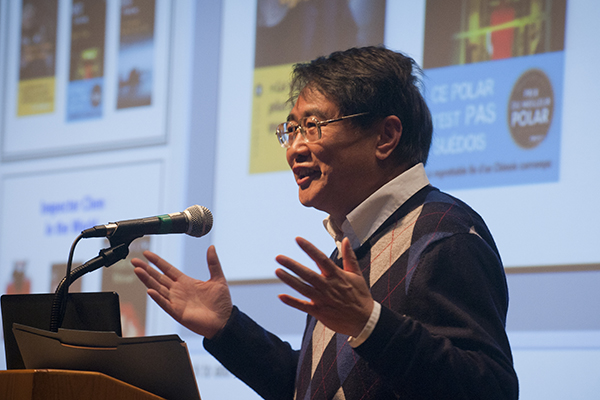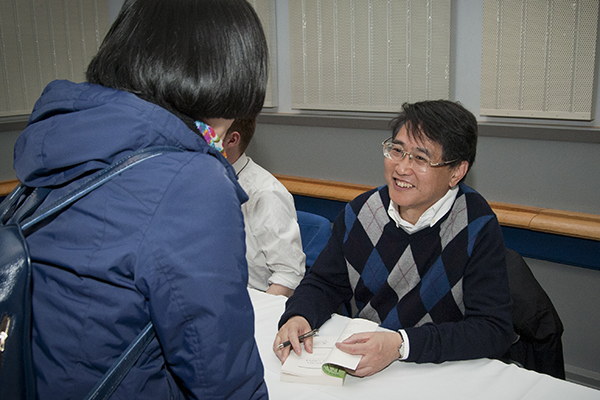


A double perspective
Crime novelist and poet Qiu discusses his work during presentation at UD
9:35 a.m., March 31, 2015--Growing up in China but now living in the United States, writing books in English as his second language, exploring issues in contemporary Chinese society but for an American audience — these all give novelist Qiu Xiaolong a valuable “double perspective,” he said in a March 24 talk at the University of Delaware.
Qiu, who is also a poet, critic, translator and academic, continues to write poetry but has become best known as the author of the Inspector Chen series of crime novels. He has written eight so far, with a ninth, Shanghai Redemption, due to be released this fall.
People Stories
'Resilience Engineering'
Reviresco June run
Changing his focus from poetry to murder mysteries “is kind of a mystery to myself” as well as to readers who ask him about that process, he said, but it seemed to happen naturally when he first decided to try writing fiction. After living in the U.S. since 1988, when he arrived at Washington University in St. Louis as a Ford Fellow and went on to earn a doctorate, he returned to his native Shanghai in 1995 for a visit.
Astounded at the changes that had occurred there, he said, he decided to try his hand at a novel as a way of examining Chinese society today. He wanted a protagonist who was thoughtful, perhaps even bookish, but who also was able to “knock on doors and ask questions” to try to uncover problems and seek solutions.
“I thought: Maybe a cop would serve my purpose,” Qiu said. “Maybe I could use [the detective fiction genre] as a framework, as a ready-made structure for a novel.”
The result was Inspector Chen, who is a poet as well as a police investigator. Qiu said his American publisher immediately accepted his first novel, offering him a contract for more books in the series, and was hesitant only about the fact that poems are interspersed throughout the stories.
“It’s kind of a trick, because nobody wants to publish poetry nowadays,” so mystery fans are forced to read the poems as part of his plots, Qiu said to laughter from the audience. But he said audiences seem to appreciate the poems and Chen’s intellectual approach.
He said he also has strived to use his own dual perspective to make his writing better. Because he knows Chinese cultural references from his own history and time living there, but because he now visits only once or twice a year, he is able to write “in the Chinese tradition” while still explaining the society to international readers, he said.
Qiu’s books have sold more than a million copies and have been published in 20 languages. At first, he said, he tried to think in Chinese and translate that into English as he wrote, “but you lose too much” in the sentence structure and linguistic flow. Now, he both thinks and writes the books in English, though he still writes poetry in Chinese.
“Since we are living in this global age, I can write for a global audience,” he said. “In my novels, I try to introduce what I call ‘the Chinese element.’ … I want to make my writing universal and at the same time authentically Chinese.”
The first Inspector Chen novel, Death of a Red Heroine, won the prestigious Anthony Award for best first novel by a mystery writer and was ranked as one of the five best political novels of all time by The Wall Street Journal.
Qiu is also the author of two books of poetry translation — he is an authority on T.S. Eliot — and a collection of his own poetry, Lines Around China.
His talk was co-sponsored by the College of Arts and Sciences’ Center for Global and Area Studies (CGAS), the Department of Foreign Languages and Literatures’ Distinguished Scholar Lecture Series and the Department of English. It was part of the CGAS spring Issues in Global Studies Lecture Series, “Globalization, Organized Crime and Terrorist Networks,” which continues with an April 20 talk by Algerian-Italian crime novelist Amara Lakhous.
Article by Ann Manser
Photo by Wenbo Fan









